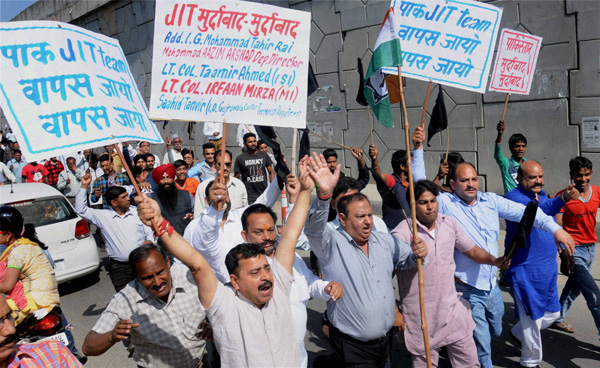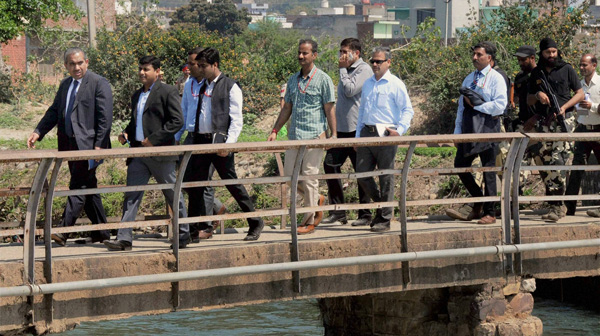Kulbhushan Jadhav: why has Pakistan Army chosen to name NSA Ajit Doval?

The timing of the 29 March joint press conference of Pakistan Information Minister Pervez Rashid and Director-General Inter Services Public Relations (ISPR) Lt Gen. Asim Bajwa on the activities of the so-called Indian spy Kulbhushan Jadhav was extraordinary, clearly sending a signal to India.
More significantly the latter's comments that have escaped adequate Indian media scrutiny so far, establish that the Pakistan army has no commitment to improve bilateral India-Pakistan ties. Had it not been so Bajwa would not have said publicly, though in passing, that "as per Jadhav, he was being directly handled by the Indian National Security Advisor and the R&AW chief and AK Gupta". This is absurd for no NSA, not an even a retired IB chief, has a direct role in intelligence gathering operation. The question therefore is why did Bajwa say so?
Also read: A spy or not a spy?: Kulbhushan Jadhav's trail in India
The dialogue
Much is being made of the success of the continuing though quiet contacts between the Indian NSA Ajit Doval and his Pakistani counterpart Lt. Gen. (Retd.) Nasser Janjua. It is claimed that this dialogue is showing success as Janjua tipped off Doval regarding the crossing of 10 terrorists into Gujarat; 3 of whom the Home Secretary, no less, claimed were eliminated "somewhere in the western sector".
Pakistani responsiveness in the Pathankot attack case including the visit of the JIT is being attributed to the new Indian approach. If all this is true, then why did Bajwa smuggle in this unprecedented charge against Doval? This is especially as Jadhav only names Gupta in the video (Indian sources have said that there is no Joint Secretary by that name in R&AW).
Clearly the present enthusiasm on Pakistan is greatly misplaced for the generals have signalled time and again, and this time to Doval directly, that they are not changing their approach, notwithstanding all the soothing words being exchanged on the Doval-Janjua channel.

Pathankot: Youth Congress activists staging a protest in Pathankot on Tuesday. The protestors are opposed to Pakistani investigators' involvement in the probe into the Pathankot airbase terror attck. Photo: PTI
The motive
The presence of the Pakistan minister, largely ceremonial for he was reduced to being a spectator while Bajwa held forth, indicates that Prime Minister Nawaz Sharif has no choice but to bow to the army as the arbiter on Pakistan's India policy. This too is one more direct signal to Prime Minister Narendra Modi and his Pakistan policy advisors.
The Jadhav video has been rightly rubbished by India. It is surprising that the ISI, which Bajwa praises as one of the best intelligence agencies in the world, has done such a shoddy job. Only if the Indian authorities get consular access to Jadhav that it may be known how the Pakistanis got hold of him. Bajwa left the matter open; he only said that the consular access bridge will be crossed when "we come to it".
Bajwa states that Jadhav was caught in the first week of March. Why did the Pakistanis delay raising this apprehension with the Indian High Commissioner to Pakistan, Gautam Bambawale till the 25 March? Clearly they wanted to ensure that the embarrassment of the JIT's visit to India for collecting material in the Pathankot airbase attack case was diluted by the so called spy drama. The timing of the Bajwa-Pervez Rashid briefing was a continuum of the same strategy. While no one in India has been duped by this puerile attempt it has worked in Pakistan where the JIT's visit has been overshadowed by the Jadhav "confessions".
The Jadhav matter has also served to cushion the gravity of the Easter Sunday Lahore blast which targeted Christians. Lahore is the Sharifs' base. The terrorist attack constituted a direct challenge to them. It also blew a hole in their policy of appeasement of religious extremists so that terrorist violence does not take place in Punjab.
Also read: Sailor or spy: is the Indian arrested in Pakistan really an R&AW agent?
The domestic Pakistani aspects of Bajwa's anti-India comments do not mean that their principal target was India. He claimed that as Jadhav was a serving officer, India was undertaking state sponsored terrorism in Pakistan, especially in Balochistan and Karachi. Drawing in China he said that the Pakistan-China Economic Corridor was a target of Jadhav's sabotage. So were Gwadar and Pasni.
He said that the Iranian intelligence was informed of Jadhav's activities. The Iranians are not amused at being drawn in an Indian-Pakistani matter. He appealed to the international community not to discriminate on terrorism. He said that Pakistan should raise the Jadhav matter at every international forum including the United Nations.

Pakistani Joint Investigation Team returning after their investigation inside Pathankot IAF base on Tuesday. Jaish-e-Mohammed terrorists had attacked the IAF base recently. Photo: PTI
A concerted Pakistani drive on the alleged Indian interference in Balochistan can now be expected. It remains to be seen if it will get any purchase from the international community but that will not be for want of trying. Meanwhile, Pakistan to show that it is serious in combating terrorism emanating from its soil will go through the motions in the Pathankot attack case. That is where the JIT comes in.
The political drama in Delhi over the JIT's visit only confirms that for the Indian political class Pakistani terrorism is only an issue an issue of political point scoring and management. It is not taken as a security challenge that requires a political consensus.
India had no choice but to allow the JIT to visit the country to collect evidence so that Pakistan can take legal action against conspirators of the Pathankot attack.
JIT's visit
However, the visit could have been have been better handled. Defence Minister Manohar Parikkar's many and contradictory comments regarding the JIT visit to the Pathankot airbase were unnecessary. Obviously an investigation team has to visit the scene of the crime.
As India has registered a case in the Pathankot attack it has demanded reciprocal facilities for an NIA team to visit Pakistan. The question is if Pakistan will give access to Masood Azhar the Jaish-e-Mohammad chief; it was the Jaish that carried out the attack. That is a valid concern and will test Pakistani sincerity and the demand should be made. But the larger question is what will be the next step should, in the remote possibility, that such access is given.
Modi has to take basic decisions about his Pakistan policy. Bad investments should be abandoned not doggedly pursued.
Edited by Aditya Menon
Also read: Jalalabad attack: Modi needs to give Pakistan a fitting reply





![BJP's Kapil Mishra recreates Shankar Mahadevan’s ‘Breathless’ song to highlight Delhi pollution [WATCH] BJP's Kapil Mishra recreates Shankar Mahadevan’s ‘Breathless’ song to highlight Delhi pollution [WATCH]](https://images.catchnews.com/upload/2022/11/03/kapil-mishra_240884_300x172.png)

![Anupam Kher shares pictures of his toned body on 67th birthday [MUST SEE] Anupam Kher shares pictures of his toned body on 67th birthday [MUST SEE]](https://images.catchnews.com/upload/2022/03/07/Anupam_kher_231145_300x172.jpg)





_in_Assams_Dibrugarh_(Photo_257977_1600x1200.jpg)
